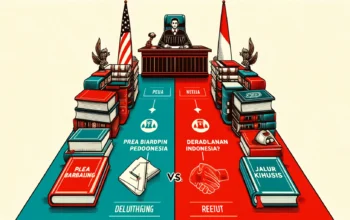Legal Literacy – Before discussing the theories of human rights (HAM) in more detail, it is best to first understand the definition of human rights themselves.
Article 1, paragraph 1 of Law Number 39 of 1999 concerning Human Rights explains that:
Human Rights are a set of rights inherent in the nature and existence of human beings as creations of Almighty God and are His blessings that must be respected, upheld, and protected by the state, law, government, and every person for the honor and protection of human dignity and worth.
Meanwhile, according to Prof. Muladi, human rights are rights that are inherently attached to humans since birth, and without these rights, humans cannot grow and develop as whole individuals.
There are at least four universally recognized theories of human rights, namely:
- Natural Law Theory
- Positivism Theory
- Universalism Theory
- Cultural Relativism Theory
Human Rights Theory: Natural Law Theory
The fundamental concept of this theory is that every human being’s life is determined by God, and all humans, regardless of their status, are subject to the authority of God. This theory believes that all individuals are endowed by nature with inherent rights that cannot be revoked by the state. [1]
These natural rights of each individual do not arise from political recognition granted by the state, but rather, these rights are inherent in their dignity and worth simply because they are born as human beings. [2]
Thus, in this theory, human rights are seen as rights granted by God and have existed since humans were born due to their status as human beings. Human rights are not granted by the state. One of the proponents of this theory is John Locke. According to him, every human being is endowed with inherent rights to life, liberty, and property, which are their own and cannot be revoked by the state.
Human Rights Theory: Positivism Theory
In contrast to the natural law theory, the positivism theory asserts that a right must originate from a clear source, such as legislation or a constitution created by the state, rather than from nature, which is abstract in nature.
Human rights, according to this theory, are based on written rules regarding human rights, so actions that do not conform to existing regulations constitute a violation of human rights. [3]
The advantage of the positivism theory compared to other theories is that everyone can defend and fight for their rights by referring to applicable regulations.
Human Rights Theory: Universalism Theory
This theory views human rights as universal, meaning that human rights are inherently possessed by each individual regardless of the values or culture upheld by a society or prevailing in a country.
There is one main slogan of this theory: “all human rights for all,” which means all human rights for everyone. This means that this theory sees that all people, regardless of tribe, race, ethnicity, and wherever they are, have the same human rights. Furthermore, this theory results in two different perspectives, namely:
1. Universal Absolute
This perspective views human rights as universal for every individual and disregards the background values upheld by a society or a country. Therefore, human rights are considered the same for everyone in the world and are not related to the inherent socio-cultural values.
2. Universal Relative
In this perspective, human rights are seen as a universal issue, and international human rights documents are considered important references. However, there are still exceptions based on recognized principles of international law. [4]
Human Rights Theory: Cultural Relativism Theory
In principle, this theory views that human rights must be placed within a specific cultural context and rejects the notion of universal rights.
According to proponents of this theory, human rights should not be universal because they must be understood from the cultural perspective of a society or country. [5]
Similarly to the universalism theory, this theory is also divided into two perspectives, namely:
1. Absolute Particularistic
This school of thought views human rights as the concern of each nation and rejects the applicability of international human rights documents and instruments.
In other words, this school of thought sees human rights as the concern of each country and does not adhere to international human rights regulations.
2. Relative Particularistic
This school of thought views human rights as universal and an international issue, but on the other hand, they must also be aligned with the values upheld by the society in each country.
Thus, even though human rights are universal, according to this school of thought, this universality must also be adjusted to the conditions of each society and country concerned.
The Human Rights Theory Adopted by Indonesia
After understanding the various human rights theories, the next question is: which theory does Indonesia adopt?
Read Also: Law and Human Rights
Indonesia itself does not tend to adhere to a single human rights theory. In fact, Indonesia applies all existing human rights theories, not just one. This can be seen from the following explanation:
Natural Law Theory
This theory states that human rights are the rights possessed by all people, at all times and in all places, because humans are born as humans.
In this theory, a person’s position in life is determined by God. The implementation of this theory can be found in Article 1, paragraph 1 of Law No. 39 of 1999 concerning Human Rights, which defines human rights as:
Human Rights are a set of rights inherent in the nature and existence of human beings as creations of Almighty God and are His blessings that must be respected, upheld, and protected by the state, law, government, and every person for the honor and protection of human dignity and worth.
Positivism Theory
This theory is the antithesis of natural law theory. Essentially, this theory states that rights must originate from or be granted by a clear source, namely the constitution, law, or contract.
The embodiment of this theory can also be found in Indonesian positive law, where human rights are granted through existing laws, such as Law Number 39 of 1999 concerning Human Rights and other laws, and also granted by the constitution, one of which is through Article 28I of the 1945 Constitution of the Republic of Indonesia.
Universalism Theory
This theory views human rights as universal, meaning that human rights are possessed by every individual regardless of the values or culture of a society or country.
The existence of this theory can be seen in our country, which also recognizes and ratifies various international human rights covenants, such as the ratification of the ICCPR through Law Number 12 of 2005. Which means various international conventions certainly adhere to universal human rights values.
Cultural Relativism Theory
In principle, this theory asserts that human rights must be placed within a specific cultural context and rejects the notion of universal rights.
The embodiment of this theory can be seen in the various reservations to international covenants, where some provisions of these covenants are not fully adopted by our country because they are considered contrary to the existing cultural values in Indonesia.
Conclusion
Thus, it can be concluded that Indonesia does not lean towards a single theory in the adoption of human rights values, but several theories can be found in the implementation of human rights in our country.
Endnote:
[1] Rahayu, Hukum Hak Asasi Manusia ( Semarang: Badan Penerbit Universitas Diponegoro, 2015), 9.
[2]Ibid.
[3] Ibid. 19.
[4] Ibid. 21.
[5] Ibid. 22.
References
- Rahayu. 2015. Hukum Hak Asasi Manusia. Semarang: Badan Penerbit Universitas Diponegoro.
- Law Number 39 of 1999 concerning Human Rights







